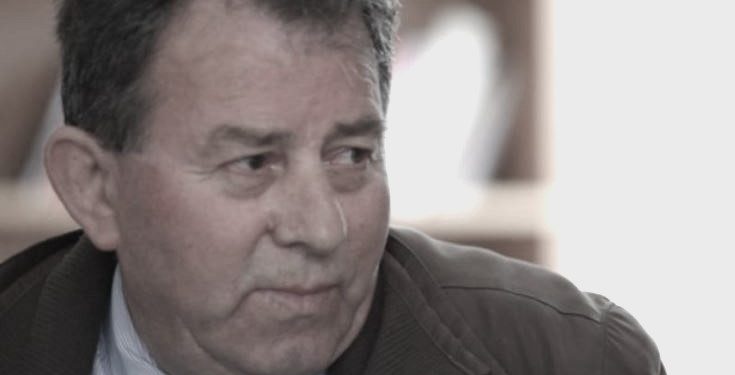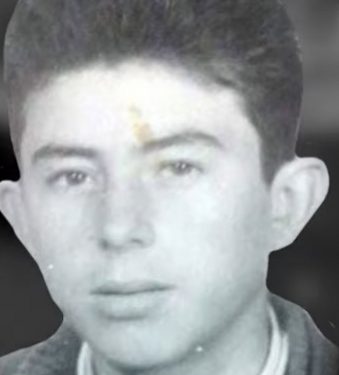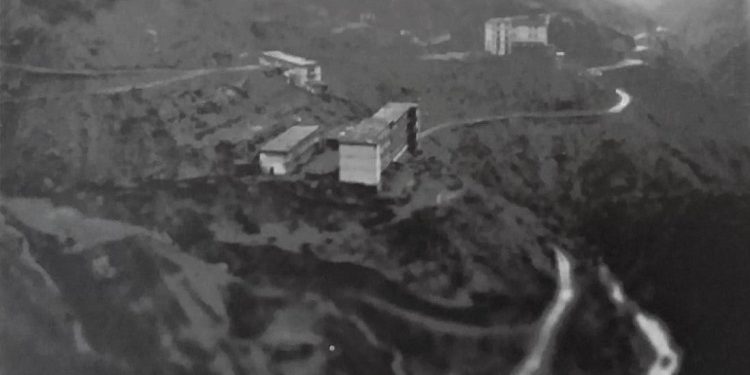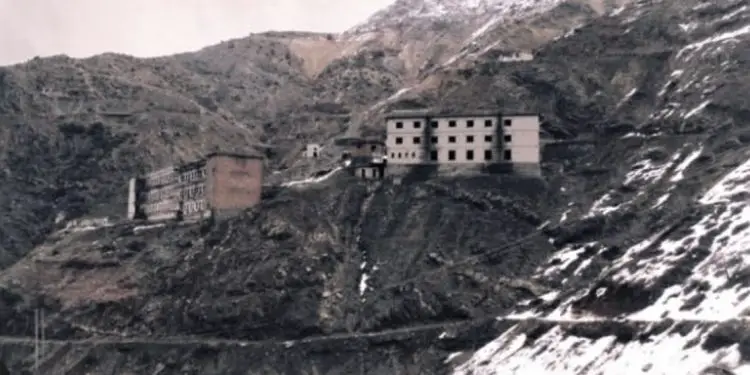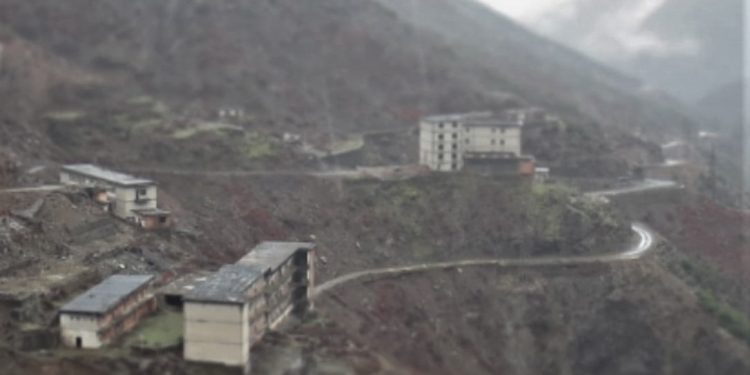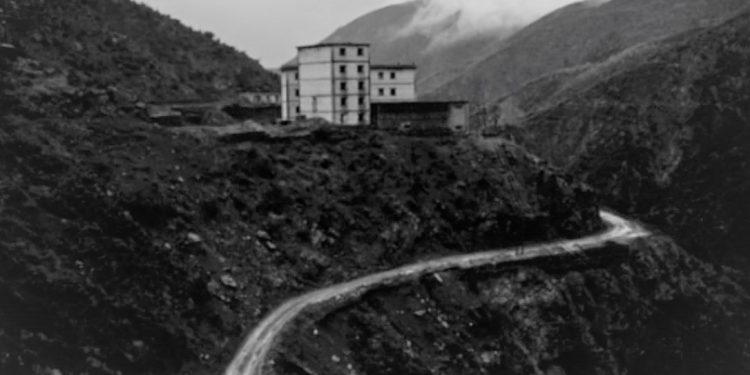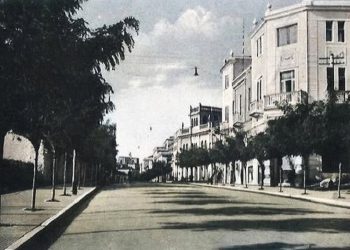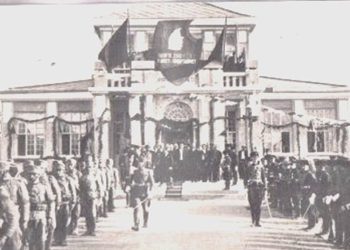By Shkëlqim Abazi
Part Nine
Memorie.al / I were born on 23.12.1951, in the black month of a time of mourning, under the blackest communist regime. On September 23, 1968, the sadistic chief investigator, Llambi Gegeni, the vile investigator Shyqyri Çoku, and the cruel prosecutor, Thoma Tutulani, mutilated me at the Department of Internal Affairs in Shkodër; they split my head, blinded one of my eyes, deafened one of my ears, after they broke several of my ribs, half of my molars, and the thumb of my left hand. On October 23, 1968, they took me to court, where the wretch Faik Minarolli gave me a ten-year political prison sentence. After they cut my sentence in half because I was still a minor, a sixteen-year-old, on November 23, 1968, they took me to the political camp of Reps, and from there, on September 23, 1970, to the Spaç camp, where on May 23, 1973, in the revolt of the political prisoners, four martyrs were sentenced to death and executed by firing squad: Pal Zefi, Skënder Daja, Hajri Pashaj, and Dervish Bejko.
On June 23, 2013, the Democratic Party lost the elections, a very normal process in the democracy we pretend to have. But on October 23, 2013, the General Director of the “Rilindje” government sent Order No. 2203, dated 23.10.2013, for; the dismissal of a police officer. So Divine Providence was intertwined with the neo-communist Rilindje Providence, and precisely on the 23rd they replaced me, no more and no less, but with the former operative of the Burrel Prison Sigurimi. What could be more significant than that?! The former political prisoner is replaced by the former persecutor!
The author
SHKËLQIM ABAZI
Continued from the previous issue
REPS
(Forced labor camp)
Memoir
The Six-Hundred-Grammer
(The routine of a day at the sleeping camp)
Someone grabbed me by the arm and pulled me back to the ground.
“Don’t move from your spot!” he told me. “This happened to all of us at the beginning! Close your eyes calm down! If you can sleep, sleep; if you can’t, just lie down!”
I squeezed my eyes shut. My judgment was clear, but sleep was dragging away like a cart horse; although it fluttered my eyelids, it just kept going. There came a moment when I was lost, submerged in oblivion. I climbed over the wire fences and entered a world full of colors. Maybe I was passing through the gate of paradise…!
Almost all the convicts, after they were taken out of the isolation rooms, had problems with the first contact with light. When a month, two, three or more passed; some even entire years in semi-darkness, in the dark and damp cells of the Departments of Internal Affairs, their sight was initially strained, then it became accustomed to this environment.
The moment they were exposed to light, they were disoriented, they lost their minds and sometimes the shock exceeded the limits of human resistance, the victim would go into shock, faint and collapse to the ground, blinded. There were cases where they lost their sight forever. The endless stay in a cell, where darkness and dampness reigned ominously, turned the prisoner into a type of beast, a kind of nocturnal bat, that hides in dark corners during the day and goes out to hunt in the darkness.
The communist system stripped man of his human qualities, reducing him to a bat in his worldview, naked in body, naked in spirit! While bats, as peaceful and useful animals, choose black clouds to protect their skin from dehydration and whitening, to get their eyes used to the excessive light, to be able to distinguish prey in the dark; people, on the contrary, are blinded by darkness, confused, bewildered, their skin is worn down and, above all, they suffer from psychological problems.
God, how the prisoner was reduced in isolation! Such a noble species, transformed into a confused wretch! How pale they came out of the isolation rooms! Transparent corpses, like rattling skeletons, dressed in parchment, you would think they would fall apart instantly! With a chalky whiteness, almost pallor, flickering, trembling, like a shroud!
These wretches would give you the creeps when you saw them coming down from the prison door, like corpses from a coffin, like specters, like emissaries from Dante’s paradise. They would appear suddenly, they would make you cringe, and they would even scare the night that had given birth to them. Now, this made you understand why in prison jargon the cells were irritably called “HELL”. And indeed, they were HELL!
When new convicts were brought to the camps, the old ones would not ask where you were from, but from which “HELL” they came. And the answers were laconic, as if to say, chained: “FROM THE HELL OF TIRANA! FROM THE HELL OF GJIROKASTËR! FROM THE HELL OF KORÇA! FROM THE HELL OF SHKODRA! FROM THE HELL OF BERAT! FROM THE HELL OF VLORA! That is; HELL, HELL, HELL, etc., etc.
While Dante Alighieri, when he fashioned HELL, surely had in mind not to leave it without a twin, so as not to be profaned. So he also invented a Purgatory, and a Paradise. Perhaps his brilliant mind with unrepeatable imagination, fashioned the ideal. THAT, where souls would be able to find their missing rest, or would atone according to the deeds they would do in this world!
Thus, he set the moral stakes that humanity should respect. He set the boundaries of destiny, he divided the spiritual galaxies. He showed humanity that it was obliged to travel forever, with the fear of sin on its back; of course, it was always a matter of after physical death, for the period of eternity.
But in communist Albania of Enver Hoxha, in every city, they installed a “HELL”, that is: a Department of Internal Affairs, where they locked up the living to die, and then buried them in nameless graves. They did not promise any paradise of joy for earthly mortals! The only way to join the eternity beyond the grave remained true death, but even that was related to faith in the Party. So, all hopes were abandoned from the Almighty God and thrown upon this paranoid creature.
However, the Albanian paradox surpassed even the Dantesque imagination. The Great God was dethroned by decree, sentenced to exile; every place of worship was torn down and destroyed from its foundations: churches, mosques, tekes, everything that reminded them of religion! What remained of the buildings had their purpose changed; they were turned into depots or anti-culture institutions. They made everyone disappear without a trace; the laity, the religious: some were imprisoned, some were shot, and others went mad!
They stimulated the Pharisees! They laid the carpet of honor for atheists, for deniers of faith! In a word, they molded public opinion to then crown on the throne Cain, Oedipus, Caligula, Nero, the black Devil, the God of misery, the God of evil, Lucifer, their Enver!
Even food caused another plus suffering for the convicts who came from isolation to the camp. Every person arrested for political activity was first isolated in the greatest secrecy. The classic form they used in these cases was very simple: the person designated to be arrested was sent somewhere under various pretexts; like work services, excursions to tourist places, or youth activities, etc.
There, the black hunters, the Sigurimi agents, were waiting with the sixty-nine “GAZ” on, they would snatch him like a hawk a pigeon, put handcuffs on his hands, and after throwing a sack over his head, and they would take him in an “unknown” direction. Upon arriving at the unknown destination, the processing would begin, which means the beating.
The first moments were really very scary, painfully crazy. Many unfortunate people suffered from psychological shock and for the rest of their lives, they never recovered; others died without beginning the investigation; still others chose to sacrifice themselves from the heights of balconies, so as not to experience the same treatment a second time, and a part broke, with the first clash; accepting everything that was asked of them, without offering any resistance.
This is a separate topic that I may elaborate on in order. Now, we will talk about the problem of food. One of the classic, most effective forms of torture was the food treatment during the investigative process. Usually, detainees were given a small amount of food. Even though legally the norm consisted of six hundred grams of bread; a ladle of soup for breakfast and lunch, and for dinner, a bowl of tea.
However, this norm was never respected because, as communism knew how to do, they always undertook savings initiatives in every field. Savings here and savings there, and in the end, people turned into animals that ate grass. One of these initiatives was the encouragement of the consumption of potatoes “as both bread and food”. Thus, the daily ration of a detainee was halved to three hundred grams of bread and three hundred grams of boiled potatoes. It is easy to imagine how torturous hunger became in those environments.
The detainees were never given the full portion, but even that little soup they were given was below standard, food that not even pigs would eat. Then, the tricks of the Sigurimi agents were endless. They would divide the daily portion bit by bit, with the aim of you rationing it yourself, but they knew very well that under the corrosive effect of hunger, the temptation would prevail. Thus, all three portions, instead of being rationed according to meals, would be devoured at once. So, practically it meant eating once every twenty-four hours.
At least I couldn’t escape the temptation; as long as I was in isolation, I never managed to ration it. As for help from the families, one could not even hope, because no one knew anything about the place where the detainee could be found, since no one spoke, without the investigative process being closed. But this lasted, often for years. The arrested people were taken hundreds of kilometers away from their settlements. Their final fate remained a mystery.
On the unfortunate ones, they exercised torture, mistreatment of the cruelest kind that even the Inquisition and the Gestapo would feel inferior. If the innovations and methods of communist violence were to be compared with those of the middle Ages, they would far surpass them. One of them was the torture of “softening.” The wretch would have a belt tied around his groin; to the buckle of the belt, a chain was attached, which was fixed to a ring on the wall. In the most unattainable corner of the cell, various foods were placed, but at such a distance that no matter how much you reached, you could never get them.
Often, the game “see with your eyes and burst with your heart,” continued for days. A full table, without being able to grab anything, would incite greed, your mouth would fill with juice, until the moment it would completely dry up; the feeling of hunger, turned into a nightmare that tormented endlessly.
Then they would change tactics, offering food and dishes with a lot of salt. The glutton would eat everything that was put in front of him, without worrying about the consequences. Then the torture of thirst would begin, which was even more horrible than hunger.
It was the turn of the second part of the game: the detainee would change position. He would be tied near a faucet, where water was running, but the length of the chain was calculated to the millimeter, so that the thirsty person could never reach the faucet. Under these conditions, feelings would become numb, judgment would be clouded, and depending on one’s personality, you would either end up insane or surrender exhausted. There were cases where the detainee could not resist the test and either his heart would stop or he would drown in his own secretions.
Under the corrosive effect of unquenchable hunger and thirst, many unfortunates accepted faults that they had never even thought of committing, accepted crimes that were never committed, accused relatives and strangers, and even people whose names they had never heard before. Just as there were those who endured with self-sacrifice, resisted to the sublime, and despised these perverse methods with disgust.
From my experience in prisons, I had the chance to meet people from all categories. I will refer to some examples that are related to the topic:
In 1970, they took me to the Spaç camp. Among others, there I met a young man from Vlora, P.L. I will only mention his initials, because all the time I spent with him in prison, I had a very correct relationship, and also because all the convicts of Spaç from that period will easily understand who I am talking about.
From the very first day, he asked me for a pack of cigarettes; the next day, a kilo of sugar. Although I didn’t know him, after he promised he would return them as soon as his family came to visit, I gave them to him. Whenever we were alone, P. would ask me for something, when I had it, I would give it to him, when I didn’t, I would tactfully refuse. But one day when P. asked me for something, a compatriot of his happened to be nearby.
“Hey, what are you doing?! Why, hey, do you think he is Rockefeller that you can be kept with food and drinks? Or do you think you’re fooling the stupid investigators? Shame on you!” he said. Qemal Merua was an old prisoner. We had become friends, since Reps. He was one of the most unique and heroic prisoners I had ever met. I felt proud of my friendship with him. But Qemal had a “quirk”; even though he was without help, he would not accept anything offered to him:
“Thank you, I’m full, I just ate!” he would answer, when someone tried to give him something. We all knew, honest Qemal was always hungry! To lighten the burden of shame, they would organize a lunch or dinner, for various reasons, and invite Qemal.
In such cases, he would accept the invitations with pleasure and felt appreciated. When he strutted to the head of the table, he would start singing in the labçe style, as only he knew how. I had also invited him several times. But let’s go back to P. I was very intrigued by what Qemal had “let slip” about the stupid investigators. One day after I treated P. to coffee and cigarettes, I asked him: “What’s this story with the investigators?”
P., without me having to repeat it a second time, told me the following story, which I am reproducing as he told me: “They arrested me for an attempted escape,” he began. “To tell the truth, I was very annoyed with this regime, because they always reminded me of my biography: ‘No, do you know who you are? No, your father was a Ballist and you are a family of kulaks! No, your uncles are enemies of the people and political exiles.’
They made me a soldier in a work unit; the pickax never left my hand. I couldn’t get enough bread, but I would sneak an extra ration from the cook or some fruit here and there when I found it. Oh, yes, and then, I also got a mistress; she was a real whore, but she kept me in cigarettes and some money. As if I would marry her!
So, I got fed up and made up my mind to escape. I talked to a friend of mine, he to a friend of his, but in the end, they denounced us and we were arrested. That was the whole story of my imprisonment. But the pear had its stem behind it, my dear! Two months of investigation, they only asked us about our escape conversation once, but they were asking who else we had talked to. The club never left my back, for two months, my brother!
But you should have seen what a wolf’s hunger I had, I was so bloated! But where was there food in the cells! On one side the beating, on the other hunger, and I became so emaciated that my stomach stuck to my back. One day during the investigation, they had me sitting on the concrete chair but, without tying me up; someone called him out and he left. On the table full of papers, my eyes caught a package wrapped in newspaper, “What if it’s bread?” I said to myself.
Should I get up, should I not get up, should I look at it, should I not look at it? Temptation pushed me toward the package. I was hungry, my friend. I reached out my hand, took it, and opened it. What did I see? Under the newspaper there was bread with cheese and a fried egg! I didn’t reach for it, I ate it. No, no, I devoured it, in two minutes! When the investigator came in, only the crumpled newspaper was left in my hand, which I quickly threw under the table. But some crumbs that had gotten stuck in the unshaved hair of my beard betrayed me.
He noticed them and lunged at me with slaps and kicks: “You scoundrel, you even ate my bread, may the plague eat you!” he hit and hit, until I fell unconscious. When I came to, I saw myself lying on the cement, in a kind of puddle. But, I couldn’t tell if it was water or blood, I was badly stunned, my whole body hurt.
Now the investigator was no longer alone; in the corner of the table, a bald fat man was sitting who must have been the boss, because I heard him speak in a commanding tone: “What did you do?! Look at him, how you’ve reduced him, and for what, huh? For a piece of bread! No, no, he is a human too! For what he has done, he will be punished according to the law; poor thing, who knows how many days he has been without eating!”
I, face down on the floor, listened with my eyes closed, but I pretended to be delirious. They continued the polemic, while I was thinking: “Strange, that there can be good people even in the Sigurimi!” but my mind went to some trick. The bald man motioned to two policemen who were guarding the door, who came and grabbed me by the arms and lifted me onto the concrete chair.
“Hey boy, I’m sorry for what happened!” he addressed me and while he was talking, he put his hand in the inner pocket of his jacket, from which he took out his wallet, opened it, and gave a hundred-ALL banknote to one of the policemen who were guarding the doorstep. “Go; buy some bread, some cheese, and salami for this boy!”
I don’t know why sympathy for this paternal-looking fat man was born in me! But I didn’t feel it; I still thought it was a trick. “Okay, I said, let’s see where this is going!” With what I had gone through, I did not believe that there could be good investigators. Not even five minutes passed, when the policeman returned with a paper bag in his hand. He put it on the table and went near the door.
“Take it!” the bald man ordered me in a fatherly tone. “Go, get full for once, and then we’ll talk. We have all the time in the world!” With the bag in his hand, he approached me and extended it. For a moment I hesitated, but when I saw the bag on his lap, I took it. “Take him to the cell!” he ordered the policemen. “Eat, because you are hungry!” he turned to me. It was the first time in two months that my hands were tied in front; they even put the bag between them and accompanied me to the cell.
As soon as I was free, I pounced on the bag. From impatience, I didn’t open it, but I tore the paper and emptied it directly onto the stinking floor of the cell. Just as they were on the ground, I gobbled them all up like a glutton. Now with a full stomach, I forgot the beating I took, the dirty cell, and the long sentence that awaited me.
“I’m full, oh what a pleasure!” For the first time since the day of my arrest, I lay down on the planks, as if I were on feathers. A seven-fold sleep of pleasure came over me, as if I were on a picnic, in the hills of my village. Late in the afternoon, the policeman woke me up for personal needs. I also spent the night soundly.
The next day they accompanied me again to the interrogation rooms, but they didn’t put me where they always took me, but in another office, one floor up. The “Bald Man” appeared before me; I call him this, because I never learned his name because he never filled out a report. When he extended his hand, I looked curiously into the pupil of his eye.
“Why are you surprised?” he hastened to tell me. “We are also creatures with feelings, you innocent! We have families, we have children! From today, we will work together. I felt sorry for you; I got rid of that beast!” I was surprised by the way he insulted his colleague, but in the meantime, I suspected that the trick was continuing.
“With me, the procedures will be simpler; we will talk openly, without gloves, as they say.” He was silent for a while, then: “Hey, shouldn’t we make a pact from the very beginning? You will tell me what you know about those who, surely, incited you and led you to ruin, and I will not ask for anything else! We will cooperate and in the end, we will both be satisfied! What do you say?” He understood that I focused on his lips, with disbelief. To show himself even friendlier, he got out from behind the table where he was sitting, approached me, and put his hand on my shoulder.
“Listen, P., I will give an order to treat you humanely, not to be abused anymore, and from today on, to be given food in abundance. We will place you in a correct room, where you will be comfortable to think in peace, about everything we talked about and will talk about. Anyway, for any need, let me know through the duty officer. We said it, we’ll do it!” He was silent and looked at me carefully.
“Well, what do you say? Should we start with those you talked to and who pushed you into hostility, against the Party?” but when he saw my hesitation, he added: “Maybe, to make the work easier, you need paper and a pen, to write what you know without rushing? To refresh your memory, I am giving you these papers, just to have for orientation.” He put some pieces of paper in front of me, a fountain pen, and a sealed envelope. Memorie.al




